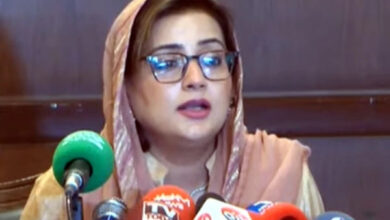Pakistan’s Finance Minister Optimistic About IMF Program, But Tax Collection Challenges Persist

ISLAMABAD:Finance Minister Mohammad Aurangzeb has expressed hope that Pakistan’s ongoing program with the International Monetary Fund (IMF) will continue, but he avoided addressing whether the government would introduce a new budget or renegotiate its annual tax collection target, which has been falling short.
The challenge of broadening the tax base has intensified, as the Federal Board of Revenue (FBR) has only collected 50% of the targeted monthly tax of 1.37 trillion rupees by Thursday, with just five days left in the month. The FBR needs an additional one trillion rupees to meet the IMF’s requirement.
The government has also hinted at negotiating with commercial banks regarding the controversial 15% additional advance tax on deposits. Furthermore, it acknowledged that non-filers will still legally be allowed to carry out transactions, excluding the purchase of property, cars, and shares.
Minister Aurangzeb stated that the government will engage with the IMF mission with sincerity, as it strives to meet its targets. Under one of the IMF’s conditions, the FBR is required to collect 6.009 trillion rupees in tax revenue for the first half of the fiscal year (July to December).
The Finance Minister acknowledged that the target of a 40% growth in tax collection this year, compared to last year’s 29% increase, was ambitious. He explained that certain tax policies and economic assumptions did not work as expected, leading to the FBR falling behind its target. However, he reassured that there would be no surprises for the IMF, as the government is fully committed to meeting its targets.
He also highlighted that tax reforms are an essential part of the government’s structural reform agenda. To control inflation, the government must manage fiscal deficits, and increasing tax revenues is a key priority. The goal is to raise the tax-to-GDP ratio to 13.5% over the next three years.
Minister Aurangzeb emphasized that the government is working on bringing transparency through digitization. This initiative, which aims to reduce corruption and harassment while increasing revenue, has been in the works for 4 to 5 months, with the design phase completed in September. Implementation is now underway.
The government is also focused on addressing tax gaps and leakages, especially in sectors like sugar, cement, and textiles.
Minister Aurangzeb stated that controlling deficits is crucial to reducing inflation, which has decreased from 30-40% to around 5%.
On the same occasion, Minister of State for Finance, Ali Pervez Malik, remarked that the government wants to ensure that the burden of fiscal measures does not fall solely on salaried individuals and industry. He added that wealthy individuals must also contribute to Pakistan’s development.





